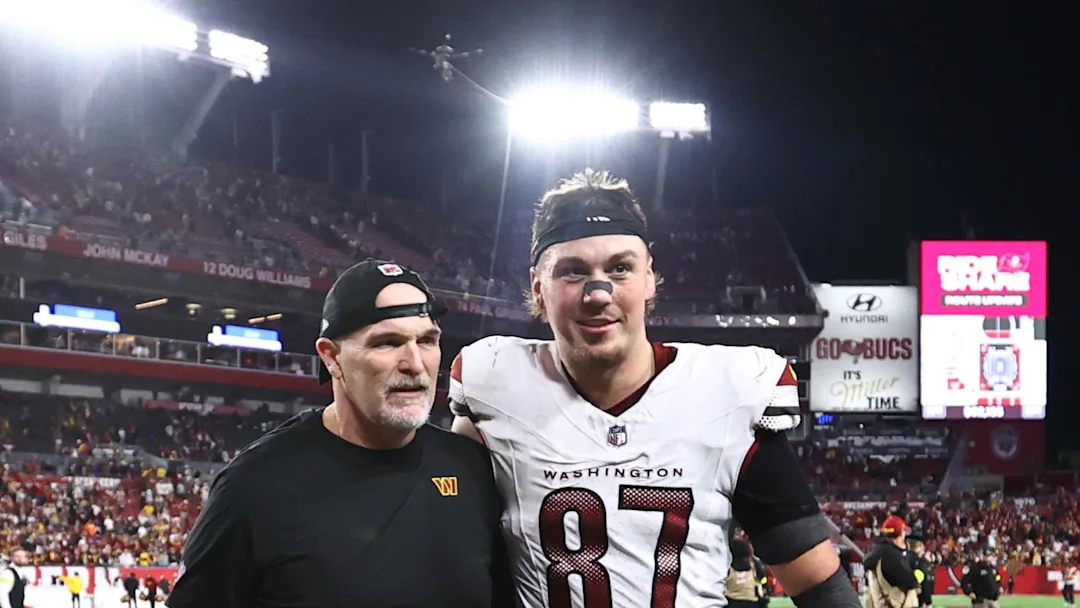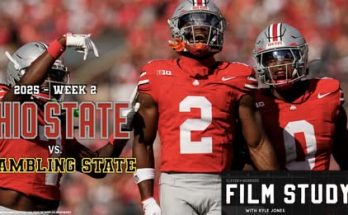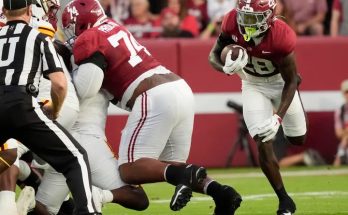Washington’s playoff victory over the Chicago Bears may have been just another step on their own path to postseason success, but for Bears fans, it was a bitter reminder of what could have been. As the Bears continue to navigate through a difficult rebuilding phase, the victory for Washington was a stark symbol of their own team’s struggles, both past and present. In this reflection, we will explore the emotional and historical context of this playoff outcome, and what it means for Bears fans looking for hope and a future championship run.
The Weight of Playoff Drought
Chicago Bears fans have long lived with the weight of a championship drought that stretches back over three decades. The last time the Bears made it to the Super Bowl was in 2006, a trip that ended in a loss to the Indianapolis Colts. Since then, the Bears have faced an almost annual cycle of disappointment. From playoff appearances that ended in quick defeats to seasons where they fell just short of making the postseason, the Bears have often been mired in mediocrity.
This latest playoff result involving Washington adds another layer of frustration to the ongoing narrative of “what could have been” for Bears fans. While Washington’s playoff victory is a sign of progress for their franchise, it is an additional reminder that the Bears, despite having a passionate fanbase and a storied history, are still in the process of rebuilding—a journey that has been much longer and more tumultuous than many hoped.
Comparing Washington and Chicago
To better understand why this victory stings for Bears fans, it’s important to look at the two teams’ trajectories. Washington, though it has its own share of turmoil in terms of ownership and management, has steadily made progress toward returning to relevance. Their recent playoff success demonstrates a level of stability and improvement that the Bears have struggled to achieve.
In contrast, Chicago’s franchise has been marked by frequent turnover at key positions, including head coach, quarterback, and general manager. Since their 2006 Super Bowl appearance, the Bears have failed to establish long-term success, often opting for short-term solutions that haven’t panned out. The team has been plagued by inconsistent quarterback play, with various players—including Mitch Trubisky, Jay Cutler, and others—failing to lead the team to sustained success.
Washington’s playoff win serves as a reminder that progress in the NFL doesn’t necessarily take a linear path, but it can happen in spurts. While the Bears continue to search for a true franchise quarterback, Washington has had success through a combination of solid defense, strategic coaching, and competent quarterback play. For Bears fans, seeing Washington succeed in this manner brings a sense of envy, as their own team continues to struggle to find the right formula for sustained success.
The Quarterback Conundrum
Arguably the most painful part of the Bears’ current struggles is their ongoing quarterback conundrum. Since the days of Hall of Famer Sid Luckman in the 1940s, the Bears have had a tumultuous relationship with the quarterback position. After a brief period of stability with Cutler, who was never able to elevate the Bears to championship contention, Chicago has cycled through a variety of quarterbacks, none of whom were able to carry the team to sustained success.
The most recent example is Justin Fields, who showed flashes of brilliance in his early years but has not yet proven he is capable of being the consistent leader the team needs. Fields is a talented athlete with a strong arm and impressive mobility, but his development has been hindered by poor coaching, inconsistent offensive line play, and a lack of reliable weapons around him. Despite the potential Fields has shown, his development has not been at the level expected by many fans, and the uncertainty surrounding his future with the team only adds to the frustration.
Washington, on the other hand, has enjoyed more stability at quarterback in recent years, with a mix of veterans and promising younger players who have been able to contribute positively. While they haven’t had a truly elite quarterback in the same vein as some other top-tier NFL teams, they have managed to find serviceable options that have allowed them to stay competitive. Bears fans have watched Washington’s steady quarterback situation from afar, with growing frustration over their own team’s inability to find and develop a top-tier signal caller.
Coaching and Organizational Stability
While the Bears have endured significant instability at head coach and within their front office, Washington has managed to maintain a level of organizational continuity that has been critical to their recent success. Coaches and general managers come and go in the NFL, but Washington has built a foundation that allowed them to not only contend for a playoff spot but win when it mattered most.
For Chicago, the coaching carousel has been a major source of frustration. Since the 2006 Super Bowl appearance, the Bears have cycled through a series of head coaches, including Lovie Smith, Marc Trestman, John Fox, and Matt Nagy. Each one has come with a sense of promise, only to fall short of expectations. Smith, who led the team to the 2006 Super Bowl, was let go after the 2012 season, and since then, the team has struggled to find a head coach who could develop a winning culture.
The Bears’ failure to establish any real sense of stability at the top has trickled down to the rest of the organization, affecting everything from player development to roster decisions. Even when Chicago has had promising talent, they have often failed to develop it to its full potential, whether due to lack of coaching, poor management decisions, or simply bad luck. Washington’s more consistent approach, on the other hand, has allowed them to find success with solid, steady leadership both on and off the field.
The Fans’ Disillusionment
For Bears fans, the combination of these factors—quarterback instability, coaching turnover, and organizational dysfunction—has led to growing disillusionment. Chicago has always been a team with a passionate fanbase, and its supporters have often remained loyal despite the team’s struggles. However, as years go by and the hope for a championship seems increasingly distant, fans have begun to grow more skeptical of the direction the team is heading in.
The playoff victory by Washington only highlights this growing sense of disillusionment. Washington, while far from perfect, seems to be on an upward trajectory, while the Bears continue to be stuck in a cycle of mediocrity. For Bears fans, watching Washington succeed—especially given that both teams have similar resources and face similar challenges in terms of division rivals—can feel like a slap in the face. It’s not just about the loss of a playoff game but about the continuing cycle of hope and disappointment that defines the team’s recent history.
The Path Forward
So what does this mean for the Bears moving forward? Can they ever break free from the cycle of mediocrity? There are signs of hope on the horizon. Fields still has the potential to become the franchise quarterback the team desperately needs, but that will require strong coaching, roster improvements, and time to develop. The new coaching staff and front office leadership will also play a key role in determining whether the Bears can finally break free from their long-standing struggles.
However, as the Bears continue to rebuild, the reality of competing in an NFL that is increasingly dominated by strong quarterbacks and well-coached teams means that the road ahead will not be easy. Washington’s recent success, while frustrating for Bears fans, offers a valuable lesson in patience, stability, and consistency—qualities that the Bears have lacked but will need to embrace if they are ever to return to prominence.
Conclusion Washington’s playoff victory over the Chicago Bears may have been just another step on their own path to postseason success, but for Bears
Washington’s playoff victory over the Chicago Bears might seem like just another small part of the overall NFL landscape, but for Bears fans, it is a reminder of the long road the team has ahead of them. It highlights the difference between two franchises that have had their own challenges but have approached them in different ways. While Washington appears to be on an upward trajectory, the Bears continue to search for the right formula to reclaim their place among the NFL elite.
For Bears fans, this latest playoff result only deepens the sense of frustration, but it also provides an opportunity for reflection. The future is still uncertain, but the Bears have the pieces in place to eventually break free from the cycle of disappointment. Whether that happens depends on the decisions they make in the coming years—decisions that will determine whether they can turn their potential into long-term success or continue to fade further into irrelevance.
Bears fans, it was a bitter reminder of what could have been. As the Bears continue to navigate through a difficult rebuilding phase, the victory for Washington was a stark symbol of their own team’s struggles, both past and present. In this reflection, we will explore the emotional and historical context of this playoff outcome, and what it means for Bears fans looking for hope and a future championship run.
The Weight of Playoff Drought
Chicago Bears fans have long lived with the weight of a championship drought that stretches back over three decades. The last time the Bears made it to the Super Bowl was in 2006, a trip that ended in a loss to the Indianapolis Colts. Since then, the Bears have faced an almost annual cycle of disappointment. From playoff appearances that ended in quick defeats to seasons where they fell just short of making the postseason, the Bears have often been mired in mediocrity.
This latest playoff result involving Washington adds another layer of frustration to the ongoing narrative of “what could have been” for Bears fans. While Washington’s playoff victory is a sign of progress for their franchise, it is an additional reminder that the Bears, despite having a passionate fanbase and a storied history, are still in the process of rebuilding—a journey that has been much longer and more tumultuous than many hoped.
Comparing Washington and Chicago
To better understand why this victory stings for Bears fans, it’s important to look at the two teams’ trajectories. Washington, though it has its own share of turmoil in terms of ownership and management, has steadily made progress toward returning to relevance. Their recent playoff success demonstrates a level of stability and improvement that the Bears have struggled to achieve.
In contrast, Chicago’s franchise has been marked by frequent turnover at key positions, including head coach, quarterback, and general manager. Since their 2006 Super Bowl appearance, the Bears have failed to establish long-term success, often opting for short-term solutions that haven’t panned out. The team has been plagued by inconsistent quarterback play, with various players—including Mitch Trubisky, Jay Cutler, and others—failing to lead the team to sustained success.
Washington’s playoff win serves as a reminder that progress in the NFL doesn’t necessarily take a linear path, but it can happen in spurts. While the Bears continue to search for a true franchise quarterback, Washington has had success through a combination of solid defense, strategic coaching, and competent quarterback play. For Bears fans, seeing Washington succeed in this manner brings a sense of envy, as their own team continues to struggle to find the right formula for sustained success.
The Quarterback Conundrum
Arguably the most painful part of the Bears’ current struggles is their ongoing quarterback conundrum. Since the days of Hall of Famer Sid Luckman in the 1940s, the Bears have had a tumultuous relationship with the quarterback position. After a brief period of stability with Cutler, who was never able to elevate the Bears to championship contention, Chicago has cycled through a variety of quarterbacks, none of whom were able to carry the team to sustained success.
The most recent example is Justin Fields, who showed flashes of brilliance in his early years but has not yet proven he is capable of being the consistent leader the team needs. Fields is a talented athlete with a strong arm and impressive mobility, but his development has been hindered by poor coaching, inconsistent offensive line play, and a lack of reliable weapons around him. Despite the potential Fields has shown, his development has not been at the level expected by many fans, and the uncertainty surrounding his future with the team only adds to the frustration.
Washington, on the other hand, has enjoyed more stability at quarterback in recent years, with a mix of veterans and promising younger players who have been able to contribute positively. While they haven’t had a truly elite quarterback in the same vein as some other top-tier NFL teams, they have managed to find serviceable options that have allowed them to stay competitive. Bears fans have watched Washington’s steady quarterback situation from afar, with growing frustration over their own team’s inability to find and develop a top-tier signal caller.
Coaching and Organizational Stability
While the Bears have endured significant instability at head coach and within their front office, Washington has managed to maintain a level of organizational continuity that has been critical to their recent success. Coaches and general managers come and go in the NFL, but Washington has built a foundation that allowed them to not only contend for a playoff spot but win when it mattered most.
For Chicago, the coaching carousel has been a major source of frustration. Since the 2006 Super Bowl appearance, the Bears have cycled through a series of head coaches, including Lovie Smith, Marc Trestman, John Fox, and Matt Nagy. Each one has come with a sense of promise, only to fall short of expectations. Smith, who led the team to the 2006 Super Bowl, was let go after the 2012 season, and since then, the team has struggled to find a head coach who could develop a winning culture.
The Bears’ failure to establish any real sense of stability at the top has trickled down to the rest of the organization, affecting everything from player development to roster decisions. Even when Chicago has had promising talent, they have often failed to develop it to its full potential, whether due to lack of coaching, poor management decisions, or simply bad luck. Washington’s more consistent approach, on the other hand, has allowed them to find success with solid, steady leadership both on and off the field.
The Fans’ Disillusionment
For Bears fans, the combination of these factors—quarterback instability, coaching turnover, and organizational dysfunction—has led to growing disillusionment. Chicago has always been a team with a passionate fanbase, and its supporters have often remained loyal despite the team’s struggles. However, as years go by and the hope for a championship seems increasingly distant, fans have begun to grow more skeptical of the direction the team is heading in.
The playoff victory by Washington only highlights this growing sense of disillusionment. Washington, while far from perfect, seems to be on an upward trajectory, while the Bears continue to be stuck in a cycle of mediocrity. For Bears fans, watching Washington succeed—especially given that both teams have similar resources and face similar challenges in terms of division rivals—can feel like a slap in the face. It’s not just about the loss of a playoff game but about the continuing cycle of hope and disappointment that defines the team’s recent history.
The Path Forward
So what does this mean for the Bears moving forward? Can they ever break free from the cycle of mediocrity? There are signs of hope on the horizon. Fields still has the potential to become the franchise quarterback the team desperately needs, but that will require strong coaching, roster improvements, and time to develop. The new coaching staff and front office leadership will also play a key role in determining whether the Bears can finally break free from their long-standing struggles.
However, as the Bears continue to rebuild, the reality of competing in an NFL that is increasingly dominated by strong quarterbacks and well-coached teams means that the road ahead will not be easy. Washington’s recent success, while frustrating for Bears fans, offers a valuable lesson in patience, stability, and consistency—qualities that the Bears have lacked but will need to embrace if they are ever to return to prominence.
Conclusion
Washington’s playoff victory over the Chicago Bears might seem like just another small part of the overall NFL landscape, but for Bears fans, it is a reminder of the long road the team has ahead of them. It highlights the difference between two franchises that have had their own challenges but have approached them in different ways. While Washington appears to be on an upward trajectory, the Bears continue to search for the right formula to reclaim their place among the NFL elite.
For Bears fans, this latest playoff result only deepens the sense of frustration, but it also provides an opportunity for reflection. The future is still uncertain, but the Bears have the pieces in place to eventually break free from the cycle of disappointment. Whether that happens depends on the decisions they make in the coming years—decisions that will determine whether they can turn their potential into long-term success or continue to fade further into irrelevance.



